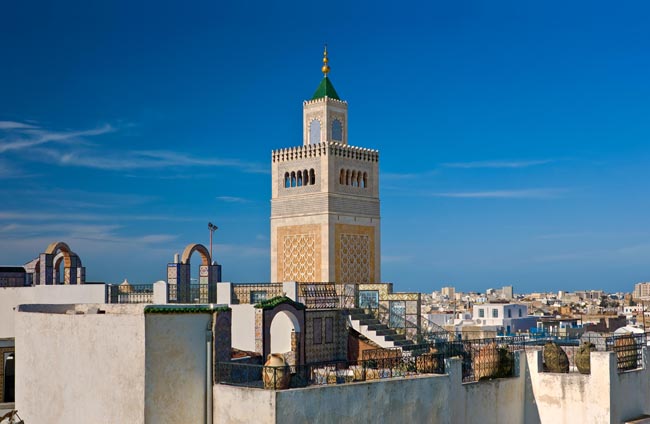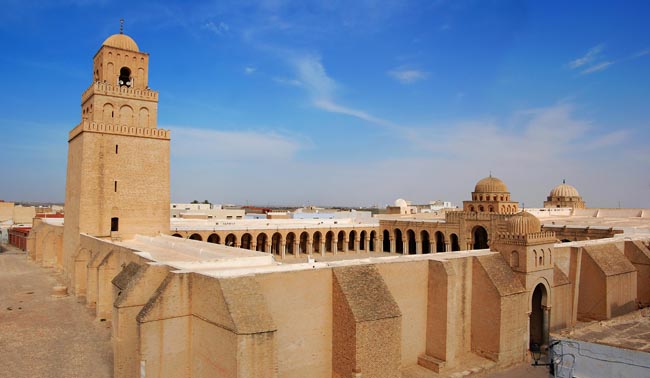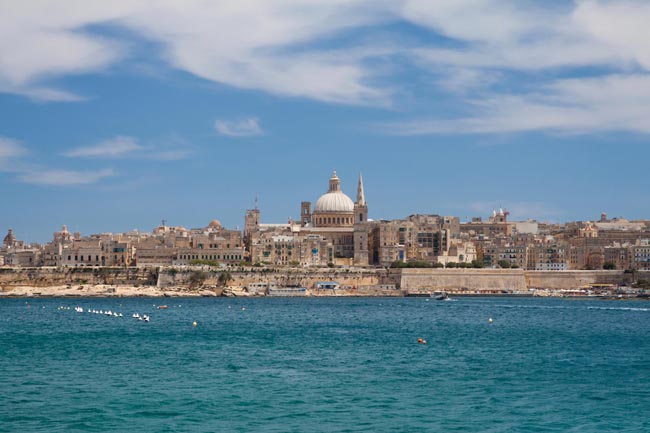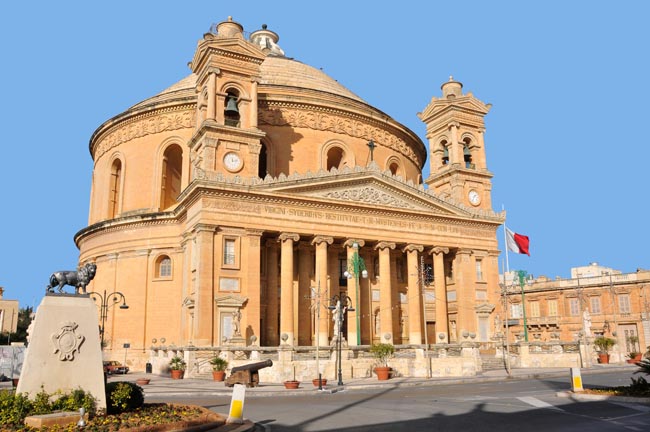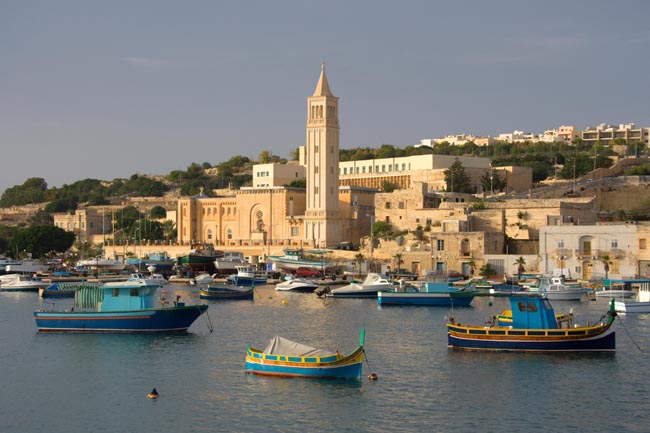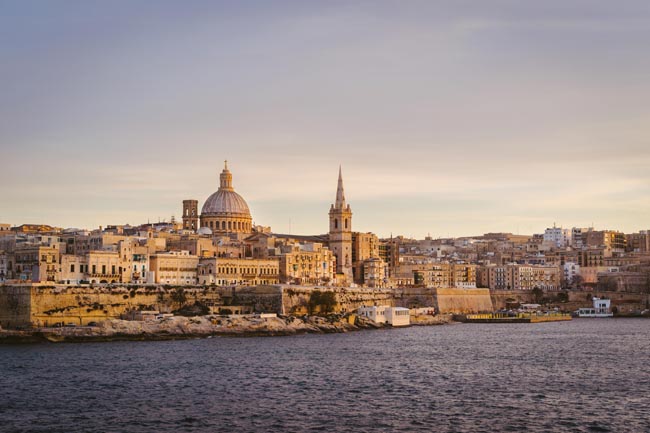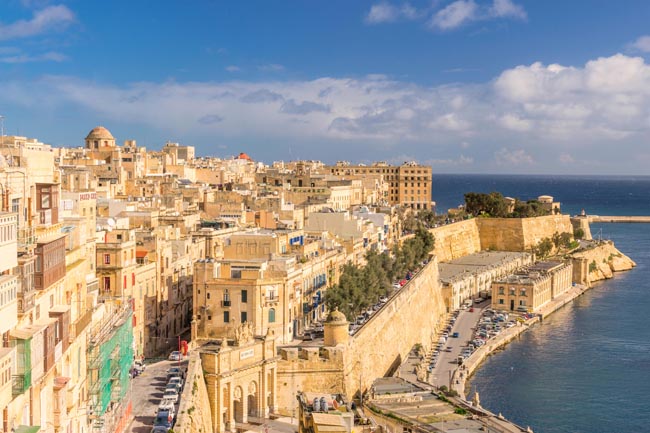Carthage, once rival to Rome, became a thriving metropolis after its conquest. Tunisia's ancient ruins, including the temples of Jupiter, Juno, and Minerva, offer a glimpse into its rich history. Our tour will explore these sites and the natural beauty of the Aghlabite basins. Malta, with its stunning architecture and unique landscapes, will complete this journey through time.
Prices below are per person, twin-sharing costs in US Dollars (USD). Pricing does not include airfare to/from the tour and any applicable taxes. For single supplement rates and taxes (if any), please refer to below Prices & Dates table. For general information on flights to/from the tour, click here.
Your Travel and Accommodation Arranged For You
Tips Included for Driver, Restaurant Staff, Local Guides
Authentic Local Experiences With Lots Of Inclusions.
Select a date below to reserve your spot:
Optional Single Supplement: $1000 USD (number of singles limited).
Download Itinerary
Day 1 Arrive in Tunis
Arrival in Tunis.
Tunis, the capital of the country, is a bustling metropolis and the home of one-sixth of the country’s population. Situated in the Gulf of Tunis on the Mediterranean Sea, the modern city extends along the coastal plains and to the surrounding hills. It is a city of many contrasts, with its modern office buildings, shopping malls and European cafes, the colonial French style of the Ville Nouvelle, and the dynamic Arab souks of Tunis' old Medina.
Overnight in Tunis.
Included Meal(s): Dinner
Day 2 Tunis: The Medina, Bardo Museum & Carthage
We begin the day with a walking tour through one of two UNESCO sites we visit today (two of the eight in the entire country) -- the old medina of Tunis with its narrow lanes crowded with mosques, tombs, and palaces. This was Tunis until the arrival of the French in the late 19th century, who subsequently built their quarters outside of the "Sea Gate" -- now the Ville Nouvelle. En route we will see the Great Mosque of Tunis, Jemaa Zitouna, and the elegant Place du Gouvernement.
We then visit the Bardo Museum, which houses the largest and finest collection of ancient mosaics in the world. These mosaics were discovered in the wealthiest of Roman villas in the many ancient cities found in Tunisia. Rich patrons commissioned a vast array of subjects and themes, from scenes of gods and goddesses, daily life (hunting, fishing, harvesting), the zodiac, seasons, amphitheatre games. From their exquisite details, we can understand why the North African school of mosaicists was the finest in the ancient world, and whose masterpieces can be found throughout the Mediterranean.
We continue to Carthage – the legendary city of Queen Dido and Hannibal (today's second UNESCO site ). We will begin with a visit to the ancient Punic cemetery -- the Tophet, or sanctuary to Baal and Tanit. Roman propaganda, hostile to their enemy, stated that the Carthaginians ritually sacrificed their children here to the gods. Our next stop is the Punic ports, once the foundation of Carthage's prosperity. Here we see the remains of what was once a sophisticated naval harbour, complete with ship sheds for dry-docking their warships, and a elaborate merchant harbor, for their fleets of cargo ships which engaged in trade throughout the Mediterranean. From here we visit Byrsa hill -- the ancient acropolis and the first area to be settled by the Phoenicians. Crowning the hill is the 19th century Cathedral of St. Louis and the Carthage museum with finds excavated from the city. Our final stop is the Antonine Baths -- the monumental public baths of the city. In the 2nd century AD, these were the largest baths in North Africa and the 3rd largest in the Roman world.
Overnight in Tunis.
Included Meal(s): Breakfast and Dinner
Not finding what you're looking for?
Our specialists can take away the stress and create a private custom tour tailored to your exact interests and budget.
Day 3 Tunis: Bulla Regia & Dougga
We leave Tunis early this morning for Bulla Regia. This ancient site is famous for its unique subterranean villas, which belonged to the wealthiest of its inhabitants; we descend to see these luxurious villas and their splendid floor mosaics, still in situ.
After lunch we continue to Dougga, the best-preserved Roman city in Tunisia and a UNESCO World Heritage Site. The monumental Capitolium temple stands in the city's Forum, with a breathtaking view over the green rolling hills and plains below. The theaters, gymnasia, baths, shops, stone paved streets and lavish villas are all testimony to the golden age this North African city enjoyed during the Roman era.
Overnight in Tunis.
Included Meal(s): Breakfast and Dinner
Day 4 Tunis - Monastir - Kairouan: City Touring
This morning we leave the capital and head toward to Kairouan, travelling through the fertile valleys and rolling hills of the North. Since antiquity to the present, Tunisia is still referred to by other Maghreb countries by the epithet, "Tunisia the Green." This area is a favorite haven for storks, who build their nest on top of telephone towers, minarets and rooftops. We head toward into the Sahel, the transitional barren region between the fertile north and the Sahara desert to the south.
Our journey takes us to Monastir, where we see the 8th century ribat, a kind of fortified Islamic monastery after which the city is named. The Ribat of Monastir affords wonderful views of the city and the sea. North African ribats were built when the inhabitants were threatened by invading European armies; they served not only a military but religious purpose as well, as fortresses and places of prayer and study for devout soldiers. This spectacular ribat served as a backdrop in numerous films, including Monty Python's 'Life of Brian' and Zeffirelli's 'Jesus of Nazareth.'
The Holy City of Kairouan is not only the spiritual center of Tunisia, it is the first Islamic city to be established in North Africa, and the 4th oldest Muslim city outside of Arabia. Founded as the capital of the region in 670 AD by the Arab general Oqba ibn Nafi, Kairouan soon acquired magnificent ramparts, mosques, palaces and hammams. Our first stop is the Aghlabid basins, enormous artificial reservoirs constructed in the 9th century to store water for Kairouan, as part of a monumental system in which water was brought by aqueducts to the city from 36km away.
We visit the Great Mosque of Kairouan, the oldest, largest and most important mosque in Tunisia. The lowest story of the towering minaret is thought to date to 730 AD, one century earlier than the structure of the present mosque. Inside we will see the colonnaded courtyard with its ancient wellheads and sundials, and the forest of columns of the prayer sanctuary. The hundreds of columns all differ from one another, in marble types, size, shape and capital designs, since most were taken from ancient Roman sites and reused in the mosque's construction. Our final stop before leaving Kairouan is the Mausoleum of Sidi Sahab, also known as the Mosque of the Barber.
We finish our day with a walking tour of old medina of Kairouan -- the entire medina is protected by UNESCO. Meandering through the lanes, we will stop to admire the beautiful traditional doors and architectural styles, the main monuments, markets, pastry shops and traditional workshops.
Overnight in Kairouan.
Included Meal(s): Breakfast and Dinner
Day 5 Kairouan - Sbeitla - Tozeur
We continue to the spectacular Roman city of Sufeitula -- modern Sbeitla. The Roman civic center is incredibly photogenic, due to the excellent state of preservation its three monumental temples dedicated to Juno, Jupiter and Minerva towering over the Forum. Sbeitla, like other North African cities, prospered in the 2nd and 3rd centuries AD under the Pax Romana. Upon entering the site, we will see olive press -- one of many in the city, since the inhabitants here became extremely wealthy from the trade of olives and olive oil. After visiting the forum and its temples, we will walk through Sbeitla's stone paved streets to see the public baths, the theater, and numerous Christian basilicas with their elaborate baptisteries covered in colourful mosaics.
Heading south, we arrive in the late afternoon at the fascinating oasis town of Tozeur. In medieval times, Tozeur was an important cultural and market center, due to its strategic location on the caravan routes. Merchants from North and West Africa gathered in this thriving oasis, trade such goods as wool, dates, gold, ivory, salt and slaves. Some of the finest dates of the world are grown in the region, the deglat nour or "finger of light". Medieval accounts state that over 1,000 camels used to leave here per day, laden only with dates!
On arrival we will visit the palmerie to view the various crops being grown, absorb the oasis atmosphere, and visit the Eden Palm Museum.
Overnight in Tozeur.
Included Meal(s): Breakfast and Dinner
Day 6 Tozeur - Douz - Djerba
Our journey continues eastwards across Chott El Jerid, Tunisia's largest salt lake, extending over 5,000km2. The chott lies 30m below sea level, and is a remnant from over 1.5 million years ago when the area was flooded by the sea. Water on the surface of the salt floor reflects strange hues of pink and yellow, and the refraction of light on this depression often creates mirages.
Our next stop is Douz, the "Gateway of the Sahara", another ancient oasis town surrounded by vast expanses of sand dunes. The final leg of our journey takes us to the legendary island of Djerba, where we will spend the first of two nights. Our drive takes us through one of the main olive growing regions of the country; Tunisia has over 65 million olive trees (6 for each inhabitant!) and is currently the 4th largest exporter of olive oil in the world.
Overnight in Djerba.
Included Meal(s): Breakfast and Dinner
Day 7 The Isle of Djerba
We will spend the morning exploring the sites of this splendid island, the country's most recently-named UNESCO site. Originally settled by the Phoenicians, the isle of Djerba is the mythical place where Odysseus encountered the Lotus Eaters during his journey back home from Troy. Phoenicians, Greeks, Romans, Vandals, Normans, Arabs, Spaniards, and Ottoman Turks -- all have come to Djerba and left their footprint. Historically Djerba has been known for its sponge fishing and agriculture -- here we can find olive trees which are over 1000 years old. The island today is one of Tunisia’s most famous resorts, with its small villages, charming towns, and 125 km of sandy beaches. Today’s inhabitants of Djerba are culturally distinct from mainland Tunisians, and are proud of their customs, dress and dialect.
Our first visit is the excellent ethnographic Museum of Patrimonie, which celebrates the island’s peoples and traditions. Here we will see displays of marriage festivals and traditional wedding dresses from various parts of the country, traditional costumes of the island, circumcision ceremonies, household and agricultural implements, and displays of typical arts of weaving, calligraphy, jewelry and metalwork. We proceed to the center of Guellala, the pottery producing center of the island where we stop to see the kilns and workshops. Next is El Ghriba ("The Miracle") synagogue: one of the oldest synagogues and most important Jewish pilgrimage sites in the world. Djerba is home to one of the world’s most ancient Jewish communities: tradition states that they arrived here after the First Destruction of the Temple by Nebuchadnezzar in 566 BC. This holy synagogue is fascinating for its historic and spiritual importance, as well as for its distinctive style of architecture (a marvelous blend of Jewish, Tunisian, Maghrebian and Sephardic elements). We proceed to the main town Houmt Souq, where first we shall stop to see the medieval fort, Borj el Kebir; this was the scene of a bloody conflict in 1560 between the forces of Dragut, the Barbary corsair, and Philip II of Spain. In town, we will explore the fruit and vegetable markets, watch the excitement at the daily fish auctions, and wander the narrow lanes and souqs. You will have free time to explore more of this charming town, perhaps do some shopping and have lunch at one of the many restaurants in the center.
The rest of the afternoon is at leisure. You may wish to stay in Houmt Souq, go to the beach, or relax at the hotel.
Overnight in Djerba.
Included Meal(s): Breakfast and Dinner
Day 8 Djerba - Matmata - Sfax
En route to Sfax, we'll make a stop at Matmata, where the inhabitants live in rock-hewn dwellings ("troglodyte" homes), some of which are over 400 years old. We will visit the pit dwelling of a local family who will happily show us around. We will also stop to see the cave home which appeared in the first Star Wars film (1977) and was later converted into Hotel Sidi Driss.
Our drive continues to the coastal city of Sfax where we arrrive in time for a walk though the medina. This is the second largest city in Tunisia; today Sfax a major commercial and manufacturing centre (mainly of olive oil, almonds, phosphates and textiles) with very little tourism. Inside the massive 9th century ramparts of the old walled city, is the country's finest "living and working" medina.
On arrival we'll walk through the medina of Sfax; part of the Blacksmith's souq was featured in the film, 'The English Patient.' We will do a walk through the historic lanes, markets and workshops.
Overnight in Sfax.
Included Meal(s): Breakfast and Dinner
Day 9 Sfax - El Djem - Sidi Bou Said - Tunis
Today we travel to the impressive site of El Djem, the final UNESCO site featured on our tour.
Our first El Djem visit is the excellent Archaeological Museum, with its splendid collection of floor mosaics from the villas of the wealthiest inhabitants of El Djem. Just behind the museum is the House of Africa, an opulent villa covering over 3000 sq m which was found in the center of town, dismantled and moved here in its entirety. The villa is named after one of its excellent fine floor mosaics depicting the Goddess of Africa (the only mosaic of its kind in the world).
The sudden appearance of the massive Roman Amphitheatre is an extraordinary sight. With a capacity of 30,000 spectators, it rises 3 stories above the surrounding plains -- though smaller than the Colosseum in Rome, it is in many ways more impressive due to its excellent state of preservation. It was built during the reigns of the (usurper) Emperors Gordion I and his son, Gordian II, both of whom reigned for only a few weeks before being defeated by the legions sent from Rome. Wild beast fights, gladiatorial combats, circuses and games were held here. We climb up to the upper tiers for excellent views of the arena and surrounding countryside, before descending to the basement to see the chambers where scenery, gladiators, prisoners and wild animals were kept. Wild animals were hoisted by a sophisticated (if not theatrical) system of elevators and pulleys into the arena to the delight of the spectators.
Our final stop is Sidi Bou Said, a charming hilltop village famous for its beautifully decorated blue and white architecture. Situated approximately 20 km from Tunisia’s capital, this town gained fame as an artist’s haven as far back as the 18th century, and many artists, musicians and writers have lived, worked, and dreamed here. Though not rich with monuments, this picturesque location is a treat, with its cobbled streets, charming corners, vibrant atmosphere, and stunning views of the Gulf of Tunis.
Overnight in Tunis.
Included Meal(s): Breakfast and Dinner
Day 10 Tunis, Tunisia - Valetta, Malta
Today we fly from Tunis to Malta.
PLEASE NOTE that, though we are often able to get a direct flight, such flights do not necessarily operate every day and, if the airlines change their schedule, today's journey may end up being more convoluted, ie with a connection in Rome or elsewhere.
Overnight in Malta.
Included Meal(s): Breakfast and Dinner
Day 11 Valetta: City Tour & Dingli Cliffs
This morning we depart on foot for a full-day tour of Valletta, the capital of Malta.*
Valletta is arguably the smallest capital in Europe -- the entire city is only 1000m (1 km) long and 600m wide! Jean Parisot de la Valette, the Grand Master of the Order of the Knights of St. John, founded the city in 1566 following the Knights' defeat of the Ottoman Turks during the "Great Siege of Malta". Massive fortifications on the seaward side were built, and a defensive ditch on the landward side. The city inside the walls was then laid out on a regular street grid pattern, and adorned with churches, palaces, auberges (inns), and the famous hospital of the Knights, the Sacra Infermeria.
We start our day with a relaxing cruise around the two natural harbours on either side of Valletta, Marsamxett Harbour and the Grand Harbour. A detailed commentary will unfold the history of Valletta and the Three Cities connected with the two Great Sieges of 1565 and 1942, as well as the other places of interest including the historical forts, battlements and creeks which can only be admired from the seaharbours, creeks, shipyards, skylines and bastions of Valletta, and the "Three Cities" are unforgettable.
We then proceed to the Upper Barakka Gardens, with its magnificent views of the Grand Harbour, and the fortified peninsulas of Senglea and Vittoriosa. Next is the Grand Master's Palace, today the official residence of the President of Malta and the seat of parliament. The palace housed the residence and state rooms of the Grand Masters from 1571 until their expulsion by Napoleon in 1798. We will visit the State Apartments and the Council Chamber where the 17th century Gobelins tapestry are hung. We will also visit the Armoury, housed in the former stables of the Grand Masters; the armoury is the largest collection in the world of its kind. Thousands of suits of armour and a huge array of weaponry are to be seen here which either belonged to the Knights of the Order or were captured as trophies of war.
You will have free time to take lunch in one of the many sidewalk cafes and restaurants in Valletta. After lunch we will see the 45 minute film "The Malta Experience," an excellent audiovisual documentary providing a detailed overview of the history of the island, from prehistory to modern times. The film is screened in the 16th century hospital of the Knights of St. John -- the Sacra Infermeria -- famous throughout Europe for its sheer size and highest standards of care.
We finish our full day with a drive to the south coast of the island. We stop for the beautiful panorama at the 220m high Dingli Cliffs with its magnificent views of the cliffs and the offshore islet of Fifla. Just beyond, at Clapham Junction, are the remnants of mysterious "cart ruts" in the limestone from the Bronze Age. These are a series of deep, intersecting parallel ruts, probably carved by sleds rather than carts.
PLEASE NOTE: Malta's Hal Saflieni Hypogeum site and tour is a popular option should you choose to extend your stay outside of our tour. We do not include it in our program as the number of visitors per day is very limited and spaces tend to sell out before many/most of our travellers commit to our tour; as such, promising the visit in our itinerary is problematic. We suggest booking your own visit once our tour is 'guaranteed' to operate.
* Most of our tours are accommodated in St Julian's, a smaller seaside district located just to the north of Valetta.
Overnight on Malta.
Included Meal(s): Breakfast and Dinner
Day 12 Valletta & Prehistoric Malta
We return to Valletta and begin the day with St. John's Co-Cathedral, the architectural gem of Malta. The church was built in the 1570's for the Knights of St. John, by the great Maltese architect Gerolamo Cassar, who also designed the Grand Master's Palace and many of the auberges of the Order. It is the masterpiece of Maltese baroque, with its rich interior decoration and paintings by the celebrated artist Mattia Preti (1613-1699). The impressive floor is paved with colourful slabs of inlaid marble, with ornate decorations and epitaphs marking the location of over 300 tombs below, including the tombs of the first 12 Grand Masters of the Order of the Knights. We will visit the Cathedral's Museum and Oratory, where hangs the masterpiece, 'The Beheading of St. John the Baptist' by Caravaggio. During his brief stay in Malta (1607-8), he was admitted (and soon expelled) from the order of the Knights, and commissioned to paint several works. 'The Beheading of St. John the Baptist' is the largest painting ever created by the artist, and the only one he ever signed.
From here we proceed to the National Museum of Archaeology, housed in an original Auberge, the residence of the division of Knights from Provence. Here we will get an overview of the prehistoric cultures, the first known inhabitants of the Maltese islands. On exhibition are the ancient artefacts of the mysterious megalithic temple builders -- dating as far back as the 4th millennium BCE.
We continue to south coast to Hagar Qim on the south coast. This temple dates to the Ggantija phase (3600-3200 BCE) and is spectacularly located on a hill overlooking the islet of Fifla. The prehistoric temples on the Maltese islands are the oldest surviving freestanding structures in the world; dating to the 4th and 3rd millennium BCE, they are 500-1,000 years earlier than the oldest pyramid built at Giza! Who were these mysterious people? Why and how did they build the temples? We also visit nearby Mnejdra Temple.
We drive to the picturesque village of Marsaxlokk set on a harbour of colourful traditional fishing boats. The boats are brightly painted in blue, yellow and red, with a vigilant eye on the bow to ward off evil, a tradition believed to date back to Phoenician times. Because most of the fishing boats of the island moor here, the Bay of Marsaxlokk has some of the finest seafood restaurants on the island.
PLEASE NOTE that on some tour dates, days 3 and 4 may be swithed around.
Overnight on Malta.
Included Meal(s): Breakfast and Dinner
Day 13 Day Trip to Gozo
This morning we head to the north-western tip of Malta to catch the ferry to the island of Gozo, which lies nearly 5km from the coast of Malta; the crossing takes only about 30 minutes. Gozo, pronounced "awdesch" in Malti, is about 1/3rd the size of Malta, 14 km long and 7km at its widest point. Gozo has its own distinctive characteristics and identity -- the Gozitans are proud of their traditions, lifestyle and dialects -- distinct from those of the main island. The island is more fertile, and economic activity is still based on farming and fishing; it is known for its magnificent landscapes, traditional villages and unspoiled coves.
We proceed to the prehistoric temples of Ggantija, one of the oldest and certainly the largest temple complexes of the Maltese archipelago, hence the folklore that they were built by giants. The largest megalith here is over 5m in length and is estimated to weigh over 50 tonnes! The two temples are surrounded by a monumental wall and date to the period 3600-3200 BCE, the same period as Hagar Qim.
We spend some time in the capital of the island, Victoria, inhabited since Neolithic times. The city encompasses both the imposing citadel, Il Kastell, perched on a high vantage point and dominating the landscape in all directions, and Rabat, the suburb outside the walls. Entering the main gate, we will explore the lanes and monuments of the citadel including its 17th century bastions, fortifications and the Cathedral of the Assumption. After a brief visit of the Archaeological Museum, we go to the Folklore Museum, a fine ethnological museum with exhibits dedicated to traditions and culture of rural Gozo. We will also wander the streets and colourful markets outside the walls.
Our last stop of the day is Dwejra for some the most spectacular coastal stretches of the island. Two huge underground caverns in the limestone collapsed to form what is today Dwejra Bay and the Inland Sea. We will take a relaxing boat trip, run by local fishermen to see the inland sea, a lagoon surrounded by cliffs which joins the sea via a 100m long tunnel through the headland of Dwejra Point. We will see the fantastic geological phenomena of the Blue Hole, and enjoy the panoramas of Dwejra Bay and Fungus Rock. The fungus (cynomorium coccineus) growing on the islet was exploited by the Knights of St. John for its wide array of curative properties. Indigenous to North Africa, but not found anywhere else in Europe, it was so valuable that the Knights built the nearby Qawra watchtower. Ferry back to Malta.
Overnight on Malta.
Included Meal(s): Breakfast and Dinner
Day 14 Mosta, Mdina & Rabat
Today is dedicated to the fascinating cities of the interior: Mosta, Rabat and Mdina.
Our first stop is the see the Rotunda Church in the city of Mosta, which dominates the landscape in all directions from its position on a plateau. Based on the design of the Pantheon in Rome, it is the 3rd largest unsupported dome in Europe after the Pantheon and St. Peter's Basilica in the Vatican. Built in the mid 19th century by a local architect and dedicated to the Virgin Mary, it has held a special place in the hearts of the Maltese because of the miraculous events of World War II. In June, 1942, three bombs were dropped on the church during mass; 2 fell in the square and one penetrated the dome -- but none of the three exploded.
One of the main highlights of the island is the ancient walled city Mdina, former capital of the island, and its suburb outside the walls, Rabat. Both have been inhabited since antiquity. In medieval times, Mdina was known as Citta Notabile where the Maltese aristocracy lived and which is reflected in the quiet dignity of its 17th century architecture and narrow shady lanes. We will stroll the peaceful streets, stopping to admire to the views from the city walls, the mansions of the nobility, the churches and Cathedral of St. Paul -- the seat of the Archbishop of Malta. You will have time to have lunch in one of the pretty cafes/restaurants.
Exiting the walls of the city through the Main Gate, we cross the moat to the suburb of Rabat. We stop first at the remains of the Domus Romana, a Roman townhouse with colonnaded courtyard and beautifully preserved mosaics. It is one of dozens of Roman villas which dotted the countryside around Mdina (Roman Melita). Here in Rabat is the Church and Grotto of St. Paul, where tradition says that he preached to the citizens of Roman Melita (Mdina) during his stay in Malta. According to Acts: 27-8, St Paul was shipwrecked on Malta on his way from Caesarea to Rome.
The governor Publius received him and gave him shelter for 3 months; he converted to Christianity, became the first bishop of Malta and was later canonized. We continue to see the series of interconnected Catacombs, the cemeteries which were dug into the rock outside ancient city walls. The two largest on the island are the so-called Catacombs of St. Paul and St. Agatha and date back to the 4th and 5th centuries. The most characteristic feature of these Paleochristian tombs is the mensa, or agape table surrounded by an inclined platform, for tomb visitors to partake in funerary feasts commemorating the dead. If the Catacombs of St. Agatha are not open, we will visit those of St. Paul.
Overnight on Malta.
Included Meal(s): Breakfast and Dinner
Day 15 Departure
Departure from Malta.
IL-VJAGG IT-TAJJEB!
Included Meal(s): Breakfast
Inclusions
Breakfast and dinner (hotels & local restaurants) daily. All sightseeing and entrance fees for sites noted as 'visited' in the detailed itinerary. Gratuities for local guides, drivers, restaurant staff, porters. Domestic flight Tunis-Malta. Airport transfers for land & air customers arriving/departing on tour dates.
Exclusions
International airfare to/from the tour. Tour Leader gratuities, lunches, drinks, personal items (phone, laundry, etc), international (if applicable) and domestic air taxes, excursions referenced as 'optional'. Airport transfers for Land Only customers. Our post-reservation trip notes offer further guidance on optional meal costs and shopping.
Malta's Hal Saflieni Hypogeum site and tour is a popular option should you choose to extend your stay outside of our tour. We do not include it in our program as the number of visitors per day is very limited and spaces tend to sell out well before many/most of our travellers commit to our tour; as such, promising the visit in our itinerary is problematic. We suggest booking your own visit once our tour is 'guaranteed' to operate.
Seasonality and Weather
This tour is offered in spring and fall when temperatures are mild, crowds thinner, and airfares lower. Spring is popular with visitors who enjoy green landscapes and wildflowers. The region has a mild Mediterranean climate with early springs and autumns that are bright and warm. Showers are possible in spring and possible in fall.
Transport and Travel Conditions
Transport throughout by private air-conditioned motor coach, 24-36 seats depending on ultimate group size (see 'group size'). Though we will have some full bus days, road travel is not particularly arduous as there are plenty of stops of interest. Roads are in good condition, though a little winding on some stretches. Short ferry crossings; scheduled flight Tunis-Malta. Walking tours on uneven surfaces.
Am I suitable for this tour? Please refer to our self-assessment form.
Activity Level: 1
No particular physical activity is involved other than town/city walks and short walks to dinners and sites of interest, some of which are large.
To learn more about the Activity levels, please visit our tour styles page.
Accommodation
Well-located, air-conditioned, mid-range hotels and inns (3-4 star) used throughout. All hotels have en suite bath, though some may have shower only. Porter service is usually available (see 'inclusions') though you should be independent with your luggage, especially at airports. Single rooms are limited and likely smaller than twins.
Staff and Support
Tour Leader throughout, local guide throughout (Tunisia), driver(s), local step-on guides in various locales.
Group Size
Maximum 18 (plus Tour Leader)
Tour Extensions
This tour is part of a series that can be upgraded to make for a longer trip. For more options, please refer to tour code/s:
Tour Overview Countries Visited: 2 Acivity Level: 1 Tour Style: Cultural
On our Algeria & Tunisia tour, we set down in the heart and capital of Algeria, Algiers, once a Barbary pirate stronghold and famed for the exploits of the pirate "Redbeard", who claimed dominion over it for the Ottoman Empire when he expelled the Spanish in 1529.
After exploring the maze of small alleys and whitewashed houses and getting our first taste of the unique Algerian culture, we head east to Setif, the commercial centre of the region built by the French on the ruins of a Roman town that was founded in the 1st century AD, stopping at various coastal towns along the way to soak in the sights.
The next few days are spent strolling through some of the best-preserved Roman sites in North Africa, gazing at magnificent mosques and typically Algerian architecture.
The 10 remaining days of our tour are spent familiarizing ourselves with the abundant bounties on offer in Tunisia, from the historic sights like those in Carthage or the ancient trading region of Sousse, to the lively, colourful markets that buzz with the activity of the friendly locals.
Tour Overview Countries Visited: 3 Acivity Level: 2 Tour Style: Cultural
On our Algeria, Tunisia & Malta tour, the entire country of Algeria makes for a fascinating historical journey and we make full use of our days taking in the innumerable remnants of the once-great Roman Empire, ancient Phoenician trading posts, splendid mosques, museums and some of the best-preserved relics and sites of antiquity in all of North Africa.
In Tunisia we spend time in Carthage, a region founded in 814BC by Phoenicians from the eastern Mediterranean and one that the Romans entirely destroyed in the 2nd century BC before incorporating it into the Roman Empire.
In Malta, we sail the routes of the Knights of St. John and the great Ottoman fleet and bear witness to monuments that can only be fully appreciated from the sea, saunter through beautiful towns and gardens, learn about Maltese prehistory in the southern regions of the island and visit its most important historical sites. Malta's abundance of attraction means we'll be busy for our last couple of days on our tour, but it'll be well worth the rewards.
Tour Overview Countries Visited: 3 Acivity Level: 2 Tour Style: Cultural
This Tunisia, Malta & Italy Tour gives us a good perspective of the considerable expanse of the Roman Empire.
From the Byrsa Hill acropolis along the Tunisian shores of Carthage, to the massive ceiling of the Sistine Chapel in Vatican City, the wealth and influence of this empire shows us why it had such great influence over the history of the Mediterranean.
The many museums throughout the tour give us valuable insight into the lives of ancient civilizations and a pleasant stroll through the preserved village of Pompeii offers a personal approach to the past.
Impressive temples, once dedicated to Greek gods, leave lasting impressions no matter what locale serves as their backdrop, be it Malta, Italy or Tunisia.
See how the imperfections of cobblestone streets throughout Sicilian villages are endearing attributes, or how the steep slopes of Malta give a unique quality to the structures built on them.
Tour Overview Countries Visited: 4 Acivity Level: 2 Tour Style: Cultural
On our Algeria, Tunisia, Malta & Italy tour, the entire country of Algeria makes for a fascinating historical journey and we make full use of our days in its locale, taking in the innumerable remnants of the once-great Roman Empire, ancient Phoenician trading posts, splendid mosques, museums and some of the best-preserved relics and sites of antiquity in all of North Africa.
In Tunisia we spend time in Carthage, a region founded in 814BC by Phoenicians from the eastern Mediterranean and one that the Romans entirely destroyed in the 2nd century BC before incorporating it into the Roman Empire.
In Malta, we sail the routes of the Knights of St. John and the great Ottoman fleet and bear witness to monuments that can only be fully appreciated from the sea, saunter through beautiful towns and gardens, learn about Maltese prehistory in the southern regions of the island and visit its most important historical sites. Malta's abundance of attraction means we'll be busy for our last couple of days on our tour, but it'll be well worth the rewards.
Sicily and Southern Italy are a highlight-packed exploration of this often overlooked yet fascinating and beautiful part of the country.
Tour Overview Countries Visited: 3 Acivity Level: 2 Tour Style: Cultural
Staring up at the ceiling of the Sistine Chapel is one of the many experiences that are expected along this Tunisia, Malta & Italy Tour, but we will be involving ourselves in many other excursions that are less renowned yet just as profound.
While in Malta, examining all the multi-coloured flowers of the Barracca Gardens in the capital city of Valletta might be comparable to the inspiration found in gazing upon the patchwork of assorted, colourful boats that slowly cruise the harbour of Marsaxlokk.
Realizing the historical significance of Tunisia involves visiting the holy city of Kairouan, where the first mosque in Africa stands, or meet someone from one of the oldest Jewish communities in the world while in Djerba.
Malta is not the only island experience in the Mediterranean; Sicily offers a whole new paradise to soak in.
The endearing qualities of narrow, market streets that wind through the city of Vucceria and the magnificence of the slopes of Royal Mountain make it easy for anyone to fall in love with this island.
The antiquity of Northern Italy seems endless as we step into Florence's Accademia and stand in front of Michelangelo's David.
Regions visited: North Africa and Western Europe
Countries visited: Tunisia and Malta
*The red tour trail on the map does not represent the actual travel path.
The following is a list of sample hotels at some locations included on this tour. The hotels shown here are meant to provide a general sense of the standard of hotel we usually aim for; they are not necessarily confirmed for your chosen departure.




Equipped with air conditioning and wireless Internet. The rooms ... ideally adapted for your business trips, as well as for your holidays.












Hotel Valentina features a unique contemporary design with an exceptional sense of style. All 128 rooms and suites are fully equipped to the highest standards, enjoying distinctive facilities and amenities, created for travellers seeking comfort and personalised experiences. Check out our latest offers for your next stay.
